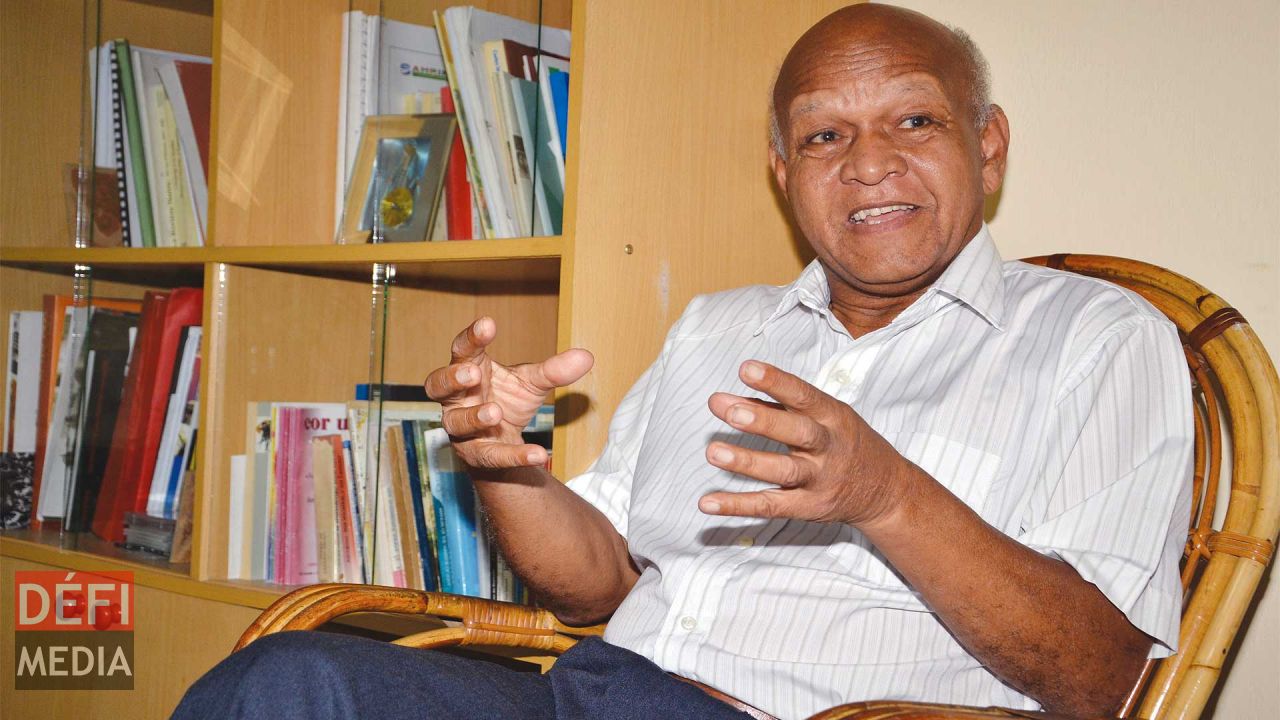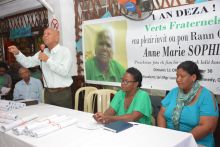
Sylvio Michel is the Chairman of the ‘Verts Fraternels’, an NGO that has been struggling for a better livelihood of the descendants of former slaves in Mauritius. He is a former MP and Minister. He remains a fervent militant for the cause of the downtrodden. News on Sunday calls on him to comment on the commemoration of the Abolition of Slavery on February 1.
What is your outlook on the living conditions of the descendants of former slaves in Mauritius and elsewhere?
May be I am expected to be satisfied of the different measures for poverty alleviation taken to avoid reparations to descendants of slaves. However, it appears that those measures are more efficient in Rodrigues than in Mauritius. In Rodrigues, descendants of slaves are exceptionally present in the spheres of decision and in the civil service.
Since the abolition of slavery to-date, no in-depth research has been carried out to evaluate the living conditions of the descendants of slaves in Mauritius. This in itself shows that there is no real concern on the living conditions of the descendants of slaves. The absence of statistical data has left the door open to discrimination in the implementation of the measures taken.
The educational system in place creates inequalities towards descendants of slaves as it is based at primary level on academic subject only and is saddled with a malignant disease known as elitism. May be the Nine Year Schooling is a relief for the children of Mauritius, but the system remains elitist and fundamentally academic: they have to fail the academic program to be oriented to vocational schools.
Do you think slavery which is termed as a ‘crime against humanity’ has been positively rendered illegal and those responsible for its propagation met with the necessary reprimand?
Slavery has been recognised as a crime against humanity by France through “La Loi Taubira” in May 2001. At the Third World Conference against Racism, Racial Discrimination, Xenophobia and Related Intolerance held in Durban, South Africa in August/September 2001, a declaration and programme action was adopted recognising in its paragraph 13, slavery as a crime against humanity. In Mauritius, in 2002 a private motion from Jean Claude Armance was adopted by the National Assembly recognising slavery and indentured labour as crimes against humanity. However, these actions and recognition have remained symbolic for nothing has been done to positively outlaw the consequences of slavery.
The descendants of slaves are still enduring the “legacy of slavery”. Those responsible for its propagation have not been answerable. In fact, those who have benefited from the system of slavery have not shown any sign of remorse. France for example, apart from enacting a law in 2001, has in May 2015 claimed that this crime against humanity can be resolved by enhancing proper development programmes. The British Prime Minister, David Cameron, has said, when visiting Jamaica in September 2015 that his government is not responsible for slavery and will not provide any form of reparation.
In Mauritius, the private sector, which has built its wealth on the blood and sufferings of the slaves, has remained silent on the issue. A crime against humanity in accordance to national and international norms must be repaired by its perpetrators. The Jews, victims of the Nazi regime, have received reparations for the sufferings endured during the Second World War. This is a clear example of what should follow for an act considered as a crime against humanity.
Can you outline a brief history of the struggle of the OF and Verts Fraternels in the context of 1 February and with what results?
The two public holidays proclaimed by the Government of Mauritius in 2001 is the result of a long struggle to bring to light the memory of the descendants of slaves. The struggle began in 1976 when the OF unveiled the first monument in memory of the enslaved people of Mauritius at the Company’s Garden in Port-Louis. In 1977, a private motion was entered under my name in the legislative Assembly for the granting of a public holiday on the 1st of February of each year; it was amended to include the commemoration of the arrival of Indentured Labourers. Though, it was unanimously voted, it was set aside due to intense local lobbies. In 1984, OF negotiated with the MSM for a public holiday on 1st February. After elections, the electoral promise was not upheld as SGD (Sir Gaetan Duval) and Hervé Duval joined forces with the MSM to oppose it.
In 1985, a symbolic public holiday was agreed to commemorate the 150th anniversary of the abolition of slavery. In 2001, VF (Verts Fraternels), partner in the MSM/MMM alliance, proposed and obtained the 1st February as a public holiday to commemorate the abolition of slavery and the arrival of indentured labour. After the elections, however, two public holidays were granted, one of which falls on the 2nd of November to commemorate the arrival of indentured labourers.
Has the Truth and Justice Commission brought any positive outcome for the descendants of slaves in Mauritius?
The Government of the United Kingdom had to make payment to all slave-owners at home and in all British colonies for an amount of £20 million to achieve the abolition of slavery and slave trade. In Mauritius, UK paid an amount of about £1.9 million to compensate the ex-slave-owners. A slave according to the ‘Code Noire’ was described as a ‘bien-meuble’. The ex-slaves who were evicted from the sugar estates had to leave for the slums in Port Louis or near the coasts and other areas to look for food and shelter.
The ex-slaves were not provided with any form of assistance neither from the Colonial Office nor their former “owners”. They had to find their way through to their new lives. This is an important issue which decades afterwards Chief Mossood Abolia, President of Nigeria, tried to address, but was ousted in a military coup and poisoned in jail. Except at the trade off in Durban, in 2001, African leaders in general have remained aloof on this issue or barely tried to include it in their agendas.
In Mauritius, OF and VF have always fought for reparations.
Reparations to the descendants of slaves must be provided for by the three former colonial powers as well as Mauritian firms which have benefited from the system of slavery and slave trade. The setting up of the Truth and Justice Commission came in late 2009 under Dr Navin Ramgoolam. There was an agreement between VF and Labour Party that should the Labour Party win the 2010 General Election, this commission will be set up. VF joined Labour Party following the breakdown with the MSM/MMM coalition in 2004. Though, we paid a huge political price for that partnership, we are satisfied today that descendants of slaves are in possession of the TJC report, opening the door for its fruitful implementation now and in the future.

Notre service WhatsApp. Vous êtes témoins d`un événement d`actualité ou d`une scène insolite? Envoyez-nous vos photos ou vidéos sur le 5 259 82 00 !



















![[Allô Docteur] Comment restaurer une dent abimée ?](https://defimedia.info/sites/default/files/styles/square_thumbnail/public/allo_300424.jpg?itok=76iq58Ul)

![[Blog] Femmes des médias : une histoire de tétons](https://defimedia.info/sites/default/files/styles/square_thumbnail/public/blog_thumb.jpg?itok=AvBkfS4H)
